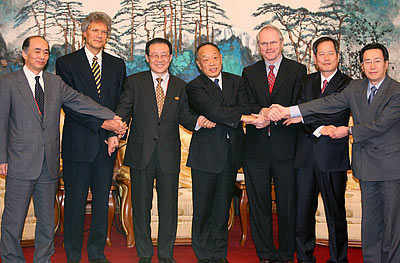| Tools: Save | Print | E-mail | Most Read |
| 6-Party Talks Yield 'New Consensus' |
| Adjust font size: |
A "new consensus" has been reached at the ongoing six-party talks aimed at denuclearizing the Korean Peninsula, Foreign Minister Li Zhaoxing said yesterday. All parties reiterated "the implementation of the September 19 joint statement, peaceful resolution of the nuclear issue on the Korean Peninsula through dialogue, and the adherence to the common target of a nuclear-free Korean Peninsula," Li said. Negotiators are seeking to implement the joint statement issued during the fourth round of talks last year, in which North Korea committed to jettison its nuclear program in exchange for aid and security guarantees. But it boycotted the talks two months later in protest against US financial sanctions. Li made the remarks when meeting the heads of the delegations to the multilateral negotiations, which involve China, the US, Russia, Japan, North and South Korea.
"Parties concerned should give priority to formulating plans for full implementation of the joint statement and take action to fulfill their own commitments in the joint statement," Li said, as negotiations look set to continue at least until tomorrow. By yesterday, 24 bilateral consultations were held between the six nations at the Diaoyutai State Guesthouse in Beijing as the talks that resumed after a 13-month hiatus entered the third day, according to the Chinese Foreign Ministry. The US and North Korea continued a second day of bilateral meetings and parallel discussions on a dispute over Washington's financial sanctions against Pyongyang's companies for alleged money laundering and counterfeiting. The chief US negotiator said last night that the US side felt it "worth continuing" the discussion. "We feel it is worth continuing this discussions," Assistant Secretary of State, Christopher Hill, told reporters at the hotel, adding the US side was "encouraged about the progress and pleased to stay a couple of days." During a meeting with North Korean top negotiator Kim Kye-gwan on Tuesday, Hill was reported to have offered a four-stage proposal, which specifies security and other rewards North Korea can expect if it halts the operation of its plutonium-producing nuclear reactor as a first step toward abandoning its entire weapons program. This is the first concrete US proposal made at an official dialogue table. However, Kim was reported to have not responded directly to the proposal, repeating only his country's position that Washington should first drop financial sanctions imposed last year. The contact between the US and North Korea for two days in a row shows "a positive sign" of improving bilateral ties, the Chinese delegation's spokeswoman, Jiang Yu, said at a media briefing yesterday. Commenting on the three days of talks, she said: "The negotiations are deepening, the focal point is becoming clear and the consensus is widening." South Korean chief envoy Chun Yung-woo said the parties initially set today as the deadline for this week's talks, but agreed to continue the session as "serious and substantial consultations" are under way. "The North's top priority is clearly what they call financial sanctions," Chun said, adding that "the participating nations reached a consensus that it is necessary to continue talks for a few more days rather than having a recess." Chun's comments are seen as a signal that the two main players, the US and North Korea, were narrowing their differences on key sticking points. He did not rule out the possibility that the ongoing session will continue through the weekend. (China Daily December 21, 2006) |
| Tools: Save | Print | E-mail | Most Read |
 |
| Related Stories |
|
Product Directory China Search |
Country Search Hot Buys |
